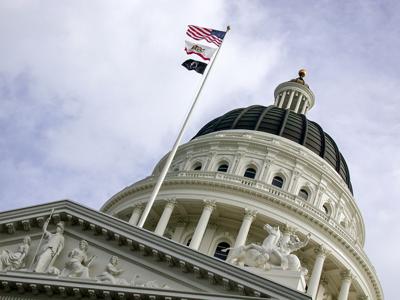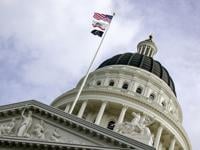
California State Capitol, Sacramento
SAN FRANCISCO - A federal appeals court has placed a hold on a new California state law that would have required businesses to begin posting public reports analyzing the alleged climate impacts of the products they make and their business processes, which business groups have said would trample the First Amendment by requiring businesses to speak on a topic at the state of California's direction, using terms dictated by California Democrats, all in a bid to "embarrass" businesses into complying with California Democrats' preferred policy goals.
On Nov. 18, the U.S. Ninth Circuit Court of Appeals issued an order blocking California air pollution and emissions regulators from enforcing the state law known as SB 261.
The unsigned order was issued without comment on behalf of "the court," saying only that the court had granted a motion by business groups for an injunction blocking SB 261 pending appeal.
That law is one of two controversial California state laws at the center of a court fight that began last year. Taken together, SB 261 and the other law, known as SB 253, would have empowered California to set up a new mandatory emissions reporting and analysis regime.
While the laws are state laws, ostensibly applying only in California, business groups and other U.S. states have said California Democratic lawmakers have designed the laws to establish a regulatory regime that would once again seek to leverage California's status as the U.S.'s most populous state and largest state economic market to set emissions reporting policy for almost the entire country unconstitutionally.
The laws would compel large companies who do business in California to report their so-called "greenhouse gas" emissions, as well as those of every company with which they do business.
The laws will also require those companies to publish on their websites reports detailing the so-called "climate-related" risks that may arise from their business activities and use of their products. And they would force the companies to "assess the steps governments might take in response to those risks and analyze how those hypothetical governmental responses - and customers’ reactions - could affect the company decades into the future."
SB 261 - the law that would require reporting and analysis of "climate-related risks" - was scheduled to take effect Jan. 1, 2026.
SB 253 is scheduled to take effect July 1, 2026.
The Ninth Circuit order does not block the state from moving forward, for now, with SB 253.
The laws have been challenged by a coalition of business advocacy groups, led by the U.S. Chamber of Commerce and the California Chamber of Commerce.
In the legal challenges pending since 2024, the Chamber and allied organizations have asserted the laws are unconstitutional violations of businesses' First Amendment rights.
The legal filings have noted that California Democrats supporting the law have publicly stated they intend to use the laws to "embarrass" businesses and continue their campaign to force all businesses, everywhere in the country, to comply with California's environmental preferences, policies and anti-petroleum zero emissions goals, regardless of the opinions of voters in the other 49 states.
They have been backed by court filings from more than two dozen other states, who have further asserted California is unconstitutionally attempting to set emissions and environmental policy for the entire country, usurping other states' sovereignty and the role of the federal government under the Constitution and in federal law.
In the only proceedings to produce a ruling, a federal judge in Los Angeles tossed the challenge to the laws. The judge agreed with California state officials that the plaintiffs couldn't show how the laws actually harm them, despite the vast number of businesses they represent.
The state also had argued the laws merely regulate so-called "commercial speech," which courts have given less protection than individual or organizational free speech.
The business groups, however, have argued the kinds of speech being compelled by these laws are no less shielded by the First Amendment, simply because the targets of the speech-regulating laws are businesses.
The business groups appealed to the Ninth Circuit in August.
However, they have accused the appeals court of essentially slow-walking the case, agreeing only to schedule oral arguments for Jan. 9, 2026, more than a week after SB 261 was set to take effect.
That delay prompted the business groups to petition the U.S. Supreme Court on Nov. 10, requesting emergency action to prevent the laws from taking effect while the business groups continue to pursue their rights to appeal.
Eight days following the petition to the Supreme Court, the Ninth Circuit abruptly granted the injunction against SB 261.
In response to the Ninth Circuit order, the business groups also withdrew their Supreme Court emergency petition on Nov. 18.
Following the Ninth Circuit's action, the California Chamber of Commerce issued a statement, saying they were "pleased" with the order.
"California businesses were facing a January 1 date to comply with a law that we believe infringes on their First Amendment rights," the California Chamber said. "Had the court not taken today's action, companies would have been forced to engage in speech that can't be undone.
"We look forward to making our case in the new year, as we believe this law and another related new law (SB 253) present untenable mandates and a dangerous precedent."






